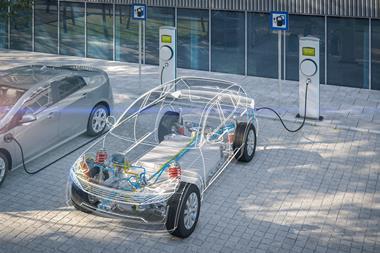As the Inflation Reduction Act (IRA) reshapes EV manufacturing, nations race to secure their place in the future of the industry.
As the automotive sector races toward an electrified future, a new battleground has emerged between two global giants: the United States and China.
In a move that could reshape the electric vehicle (EV) manufacturing landscape, the Biden administration looked to exclude Chinese entities from accessing lucrative tax credits earmarked for investments in the U.S. EV supply chain.

The Bipartisan Infrastructure Law, with its $6 billion allocation for batteries and critical minerals, coupled with the Inflation Reduction Act (IRA) providing subsidies of up to $7,500 for each new energy vehicle, explicitly bars any involvement of what it deems “Foreign Entities of Concern” (FEOC).
In terms of what qualifies as FEOCs, this broadly covers terrorist groups, but in the context of the IRA it is businesses significantly influenced by the governments of China, Russia, North Korea or Iran.
With China’s significant stake in the global battery supply chain, often through joint ventures with Western counterparts, these stringent regulations could reverberate across industries worldwide, prompting a scramble to secure alternative supply chains and sparking tensions between economic powerhouses.
This crackdown comes amid growing geopolitical tensions and concerns over supply chain security. With the regulations excluding any clean-energy vehicle containing battery components manufactured or assembled by FEOCs, and subsequently widening to encompass critical minerals by 2025, the automotive industry faces a pivotal juncture.
The delayed implementation until 2027 for certain exemptions underscores the complexities of disentangling global supply chains. As Senator Joe Manchin vows to challenge what he deems “unlawful” regulations, and industry leaders navigate the intricacies of compliance, the quest for EV supremacy intertwines with broader geopolitical maneuvers.
In March, U.S. Energy Secretary Jennifer Granholm expressed concern about China’s influence on the EV market in the U.S.
“We are very concerned about China bigfooting our industry in the United States even as we’re building up now this incredible backbone of manufacturing,” she said at an Axios event in Washington.
Granholm emphasized the U.S.’s desire to prevent a recurrence of China’s dominance in the solar panel market. She highlighted that solar technology originated in the U.S. but was overshadowed and outpaced due to market saturation caused by China’s aggressive presence.
What exactly is the IRA?
The IRA introduces a range of federal income tax credits targeting the affordability of clean energy equipment and energy-efficient upgrades for households.
It offers a tax credit of up to $7,500 for new EV purchases and $4,000 for used EVs. Effective since January 1, 2024, recent amendments impact the claiming process and eligibility criteria for EV tax credits.
While these changes simplify the process by enabling point-of-sale discounts for EV purchases, they also refine qualifications, potentially limiting the range of eligible EV models.
What is the impact on supply chains?
The impact on supply chains stems from the IRA’s stringent regulations regarding the sourcing and manufacturing of components for EVs.
By requiring a significant portion of critical minerals and battery components to be domestically sourced or sourced from Free Trade Agreement (FTA) partners, the IRA incentivises the development of a domestic mine-to-battery supply chain.
This move seeks to reduce reliance on foreign entities, particularly China, which currently holds a dominant position in the global battery supply chain.
Consequently, companies that have partnered with Chinese entities for battery inputs such as lithium, cobalt, and nickel may face challenges in complying with the IRA’s requirements.
This could lead to a reshuffling of corporate structures, investments in new Western capacity, and disruptions in existing supply chain arrangements as companies strive to adapt to the evolving regulatory landscape.
What does this mean for risk managers?
For risk managers, with stringent regulations on domestic sourcing and manufacturing, organisations face the imperative to diversify supply chains and mitigate dependencies on Chinese suppliers.
Navigating regulatory compliance, assessing supplier risks, and monitoring geopolitical tensions are paramount. Robust business continuity planning becomes essential to ensure resilience amidst potential disruptions.
By proactively addressing these challenges, risk managers can safeguard against supply chain vulnerabilities and capitalise on emerging opportunities in the evolving landscape of EV manufacturing.
How has the IRA been received?
“The IRA has led to greatly accelerated investment in EV and battery manufacturing and jobs,” said Peter Slowik, U.S. passenger vehicles lead at The International Council on Clean Transportation (ICCT).
“A new report by the EDF (Environmental Defense Fund) estimates that U.S. EV investments have grown to $188 billion and 199k jobs over the last nine years. Specifically, most of these announcements and investments occurred since the passage of the IRA.
“They found that investments have accelerated and that more than 61% of the total investments occurred since the passage of the IRA.”
Slowik said the IRA dramatically expands the tax credits for EV purchases as well as industry investments to bolster the domestic supply chain and charging infrastructure buildout.
“The combination of investing in domestic EV and battery manufacturing plus restricting EV tax credits to vehicles and components that are produced within the U.S. and its trade partners greatly encourages more of the supply chain to be developed within the U.S. and its trade partners,” said Slowik.









No comments yet